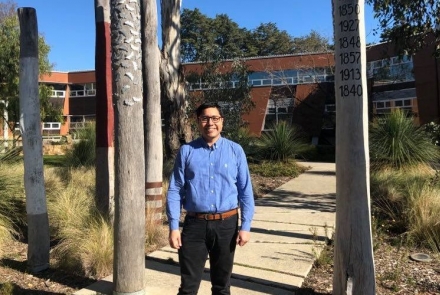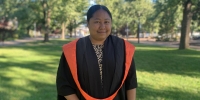
The importance of connection: Study with Christian Gomez Carrasco
In our new ‘Study with’ series, we hear from Crawford’s students and graduates about their time studying public policy. Despite it bringing many challenges, COVID-19 has also opened up fresh opportunities for online study. In the coming weeks, our students will talk about their experiences studying online, and share their tips about how to make the most of it.
For Crawford School student Christian Gomez Carrasco, the transition to online learning has demonstrated the value of technology in bringing people from around the world together to learn about public policy.
Coming from a background where getting access to quality education is difficult, Christian appreciates the opportunities technology offers for learning experiences.
For him, the best place to focus on online seminars and readings turned out to be his own home, where he could create ideal conditions.
“Technology is making it possible for people located in different parts of the world to get together to learn about common interests from some of the best public policy researchers.
“Because I’m easily distracted, I prefer to study in the comfort of my room with the right amount of light, perfect temperature, a reliable internet connection, and with a view of the natural landscape through my window for my reading pauses.
“I switch off my mobile notifications, and above all, I make sure that it’s quiet to make sure that I can progress my study without interruptions.”
Christian found that having lectures online gave him the chance to go over the content as often as he liked.
“For students like me whose first language is not English, the option to revisit the content of the class as many times as I need it, at varying audio speeds or adding subtitles, has been very beneficial.”
Due to the way climate change has already affected his community Piura, a northern coastal city in Peru, he really enjoyed learning more about environmental policy and communications.
“In my city, the rise of the global temperature has increased the frequency and intensity of El Niño–Southern Oscillation (ENSO) that has already taken the lives of many people.”
“I most enjoyed ‘Environmental Policy and Communications’. The first lesson I learnt in this course is that as academics or researchers we can’t just assume that what we say or what we intend to communicate to our audience is actually what is getting through to them.”
The ‘Communicating for Environment and Climate Policy’ also impressed Christian, because of how topics were all connected to each other across lessons, and because of course convener Dr Rebecca Colvin’s unending dedication to providing the most recent and relevant research in the field whilst also keeping an eye out for her students’ wellbeing.
“I really enjoyed the interconnection between the topics covered each week. As one of my best friends said, ‘I love the practical way this course runs!’.
“Our lecturer made a permanent effort to provide us with the most up-to-date information on topics, presenting us with weekly interviews with experts, and even inviting the authors of our readings. But at the same time and just as importantly, she cared about different life circumstances students were experiencing during this unusual year, and paused for a quick chat before starting our virtual session.”
One of the main take-aways that Christian got from the course was that decision-makers often can’t make a decision, even though they are convinced it’s the right thing to do, unless they have got public support.
“But how does one win the favour of their audience? From Dr Goldberg, another guest speaker on the course from the Yale University program on climate change communication, we learned that if a speaker gives you concrete information that is consistent with the larger mental model of how you understand the world, then it will probably be more durable, especially if that fact is memorable.”
In order to tackle the challenges associated with extended screen time, Christian recommended breaking up study sessions by chatting to other people, staying active and getting a good sleep.
“Develop the habit of studying at the same time and in the same place. Along with the long periods of individual wide research, try adding interaction with other people as too much screen time is unhealthy for kids and adults. We all enjoy some good content on our computers or phones but managing screen time is important regardless of age.”
On top of that, Christian has chosen to show his appreciation for the opportunities he’s had by giving back to society.
“There are many ways of giving back. For example, make an effort to actively listen to people, volunteer or donate plasma. Having the opportunity to study the best public policy research in the world at a school like Crawford is an enormous privilege in a society that tries every day to learn from its errors.”
Updated: 12 August 2024/Responsible Officer: Crawford Engagement/Page Contact: CAP Web Team












